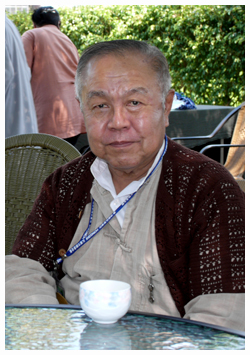 Honouring eighty years if living and working for justice, peace, democracy and sustainable livelihoods. Sulak Sivaraksa, born in 1933, is a prominent and outspoken Thai intellectual and social critic. He is a teacher, a scholar, a publisher, an activist, the founder of many organisations, such as the Thai NGO “Sathirakoses-Nagapradeepa Foundation", and initiator of a number of social, humanitarian, ecological and spiritual movements and organizations in Thailand, like the College SEM (Spirit in Education Movement). Known in the West as one of the fathers of the International Network of Engaged Buddhists (INEB), established in 1989, Sulak Sivaraksa is also an author of more than a hundred books and monographs in both Thai and English. Honouring eighty years if living and working for justice, peace, democracy and sustainable livelihoods. Sulak Sivaraksa, born in 1933, is a prominent and outspoken Thai intellectual and social critic. He is a teacher, a scholar, a publisher, an activist, the founder of many organisations, such as the Thai NGO “Sathirakoses-Nagapradeepa Foundation", and initiator of a number of social, humanitarian, ecological and spiritual movements and organizations in Thailand, like the College SEM (Spirit in Education Movement). Known in the West as one of the fathers of the International Network of Engaged Buddhists (INEB), established in 1989, Sulak Sivaraksa is also an author of more than a hundred books and monographs in both Thai and English.
Educated in England and Wales, Sulak returned to Siam in 1961 at the age of 28 and founded Sangkhomsaat Paritat (Social Science Review). This became Siam's foremost intellectual magazine, dealing with numerous political and social issues during the time of the military dictatorship. Sulak's work editing Sangkhomsaat Paritat led him to become interested in grassroots issues. He learned that to truly serve society, one must stay in touch with the poor people. Beginning in the late 1960s he became involved in a number of service-oriented, rural development projects, in association with Buddhist monks and the student activist community.
During the 1970s Sulak became the central figure in a number of non-governmental organisations in Siam. These include the Komol Keemthong Foundation (named for a young teacher killed in 1971), the Pridi Banomyong Institute (named for the father of Thai democracy), the Slum Childcare Foundation, the Co-ordinating Group for Religion and Society, the Thai Inter-Religious Commission for Development and Santi Pracha Dhamma Institute. Through his involvement with these organisations, Sulak began to develop indigenous, sustainable, and spiritual models for change. Since then he has expanded his work to the regional and international levels. He has co-founded the Asian Cultural Forum on Development and the International Network of Engaged Buddhists.
In 1976 Siam experienced its bloodiest coup. Hundreds of students were killed and thousands were jailed. The military burnt the whole stock of Sulak's bookshop and issued an order for his arrest. Although Sulak was forced to remain in exile for two years, he was able to continue his activist work in the West. He lectured at the University of California Berkeley, Cornell University, the University of Toronto, and throughout Europe.
In 1984 he was arrested in Bangkok on charges of criticising the King, but international protest led to his eventual release. In 1991 another warrant was issued for his arrest and Sulak was forced into political exile once more. He came back to fight the case in the court in 1992 and won in 1995. At the end of that year he was granted the Right Livelihood Award, also known as Alternative Nobel Prize, and in 2011, Sulak Sivaraksa was awarded Niwano Peace Prize.
** Information retrieved from http://www.sulak-sivaraksa.org |

